
 Reading, Short And Deep #098
Reading, Short And Deep #098
Eric S. Rabkin and Jesse Willis discuss Morgue Ship by Ray Bradbury
Morgue Ship was first published in Planet Stories, Summer 1944.
Here’s a link to a PDF of the story.
Posted by Scott D. Danielson

 Reading, Short And Deep #098
Reading, Short And Deep #098
Eric S. Rabkin and Jesse Willis discuss Morgue Ship by Ray Bradbury
Morgue Ship was first published in Planet Stories, Summer 1944.
Here’s a link to a PDF of the story.
Posted by Scott D. Danielson

 The SFFaudio Podcast #452 – Jesse, Scott, and Paul Weimer talk about The City And The Stars by Arthur C. Clarke
The SFFaudio Podcast #452 – Jesse, Scott, and Paul Weimer talk about The City And The Stars by Arthur C. Clarke
Talked about on today’s show:
We three met, “a reaction” to The Broken Sword by Poul Anderson, I wonder what these guys will think Jesse will think of this book?, idea filled, big ideas, explorations of societies, tons of imagination, successfully modeled my brain, idea after idea after idea, a neutered human, this weird society, the jester, how art works, fear blocked, cut off from the whole universe, reminiscent of Olaf Stapledon, this is Clarke’s Last And First Men, a rewrite of Against The Fall Of Night, Gregory Benford’s sequel, a rethinking of the original book, different Bach fugues, from a writing perspective, more to contribute, the British Interplanetary Society’s webpage, 2013, 1930s, the opening scene, 1935, six versions, Gnome Press, 1953, 1956, the Wikipedia entry, to showcase what he had learned about writing and information processing, in the individual scenes, Diaspar and Lys, the anecdote, different enough, the robot with the mental block is solved in two different ways, to FMRI the robot, robot psychology, so much in this book, Hal 9000, 2001: A Space Odyssey, The Sentinel, what drove his whole career, Paul is quiet, the Mad Mind of this novel, a battle at the end of eternity, more about computers and artificial intelligence, game theory, they’re not really human at all, they never have a childhood body, they’re never actually human, bio-manufactured like the robots in Westworld, emotionally muted, a whole book for someone else, the lack of love in Diaspar, factoids, John W. Campbell, telepathy, Startling Stories, the fact that everybody is telepathic, Jesse can become telepathic, the only kind of telepathy that makes any sense, modelling, the telepathy doesn’t pay-off, a balance between the world of Diaspar and the world of Lys, civilization vs barbarism, an equal but different, the whole problem of a lack of conflict, an Olaf Stapledonism, an excellent point, biological vs. technological, Apollonian vs. Dionysian, Zardoz is Sean Connery in a diaper, a brute barbarian, weird WTF moments, reborn over and over again, continuity of millennia, the futility of immortality, editing of memories, an inversion of Logan’s Run, a central computer, a society of youth vs. a gerontocracy, perturbing the system, let’s posit a future in which a global catastrophe has happened, a forbidden zone outside, a robot that goes crazy, the back half of Logan’s Run, This Perfect Day by Ira Levin, The Giver by Lois Lowry, how Alvin has tucked away genitals, hairless except for his head, drugs, a flat affect, “Wei, Wood, Marx, and Christ”, Brave New World, “Our Ford”, a factory societies, a dystopia utopia, the RPG elements, Dream Park, “he breaks the railroad”, railroading in RPG terms, the sagas, how this novel works, his adventure outside the city (to the stars), Cthulhu or something?, Lovecraftian elements, “we have lived too long out of contact with reality”, the world shaker, seduced by Lys, a very soft horror, the hermit kingdoms of Korea and China, the treasure ships, forcing trade upon you, an outside force, he’s pre-programmed, he’s the only who isn’t pre-programmed!, even the jesters, a foreshadowing, “Repent, Harlequin!” Said the Ticktockman, from the robots point of view, their whole undercity, places to dust, do they have their own system?, sitting in the background while Alvin is exploring the depths of the city, how the humans are, intelligence machines looking at art, in other hands (not Clarke’s), how art is chosen, what those pieces of art look like, art without conflict, still life for everyone, no machine may contain any moving parts, Steve Jobs, an oval egg you keep in a drawer and don’t look at, Universe by Robert A. Heinlein, optical fiber, control systems, no repairmen necessary, look at this mural, now the robots have something to do, the bones of old Rome, they don’t know what the word “tomb” means, the Great Ones, the Old Ones, the great race of Yith, a fake out, how the city was constructed, experiences the city of Disapar from a billion years in the past, this is all a dream, I take away the blocks that you have, you are free now, parallels, the difference between the humans and the robots, less hairy, metal?, “Rivets and Trees”, Marissa, HBO’s Westworld, nefarious vs. right and proper, thoughtful and philosophical, humans and robots, Blade Runner, at least one of the characters is an older robot, nuts and bolts inside, three kinds of robots, Diaspar is Westworld’s future by a billion years, guests and staff, now you are Mickey Mouse, the names, diaspora and lis, identity politics of 2017, you can’t use the word tribe, a white male protagonist, is he white?, is he male?, is he human?, a long flowing yellow mane or a curly tight man bun, being human or not, going full Olaf Stapledon, the future history has no bearing on 2017’s obsessions and attitudes, the Long Now Foundation, long term consequences, technological vs. biological, everybody is concerned about that, a Wiki of Ice and Fire, Lys (off the coast of Essos), George R.R. Martin, Dis (a layer of Hell), the heaven where everybody is the same, the city of Dys where everybody is the same, leaving both, the 1980s Alvin the robot submersible, looking for hidden things, playing the sagas, Skyrim, the final scene, in polar orbit, the night was falling, Scott’s entire reading life, sensawunda, seven strange stars arranged in a line, back to Earth, an ever expanding circle of exploration and wonder, among the stars, no eye-rolling, a hero’s journey, circular, an old Locus issue celebrating Robert A. Heinlein, one of the pictures of Heinlein visiting Arthur C. Clarke in Sri Lanka, The Night Flier, a Cessna Skymaster, an incredibly weird guy, Lord Dunsany, he leaves the world, literally on the other side of the world, remarkable, a global influence, an internet like life before that was possible, how amazing his computer is in this, an intelligence machine, a non-distributed and smarter Siri, government by AI, doing stuff with computers that nobody is doing (even Isaac Asimov), what they do rather than how they do it, totally timeless, we’ve gone past atomics, infinity plus one, he knows what computers are about, process information, storage, we are robot computers with biological casings, circuits and synapses, is there anything in this story that feels dated?, holographic projection, unsqueaky chair, amazing!, urtexts, cleanly and generically, the trappings are timeless, their genitals don’t work, sex, kind of interesting, the fish in the sea, a radar operator during WWII, bouncing radar off the Moon, what this technology can do, why are we worrying about breaking these Nazi codes?, a plot, so good, full of ideas, The Collected Stories Of Arthur C. Clarke, a lot of Clarke is public domain, The Nine Billion Names Of God, The Star, everyone should read more of Arthur C. Clarke, 4001: A Continuing Of The Odyssey The Should Probably Have Been Left In The Drawer, Rama, Paul has issues with Gregory Benford, stick to the originals, the Black Sun, E.E. Doc Smith, black holes, until Hawking thought about how black holes could evaporate, a really good book, the audiobook, other versions, the one on Audible has music under the narration, the book for the blind version, Northstar Publishing, audiobook rental stores (like Blockbuster), truckers were the original hyper-consumers of audiobooks, women were supposed to have been the ones to make the household magazine purchasing decisions, mainstream, commuters (and everybody) not the women of the house, when Amazing Stories broke into the market, Railroad Romances, Westerns, women wanted to read about science fiction, I’m not a trucker, the BBC audio drama of The Hitchhiker’s Guide To The Galaxy, abridged audiobooks, blind people aren’t the only ones who need audiobooks, if you didn’t see them on the shelf, totally out of print, nobody can get this one, a deep cassette hum, Paul’s trip to Yellowstone in 2005 (got him into audiobooks), a great idea, 2003, Audible’s 20th anniversary, before iPods, overseeing the explosion of audiobooks, nothing that isn’t unabridged, audiobooks are mainstream, are more people listening to books than are reading books now, where did you get that time?, double density book-cassettes from Brilliance audio (each channel having one track), apparently cassettes were expensive, CDs are still around, 40 CD audiobooks, Blackstone Audio rentals, Downpour has rentals, Books On Tapes, Audible by mail (Netflix for audio), Recorded Books, a slight competitive advantage, Bryan Alexander.
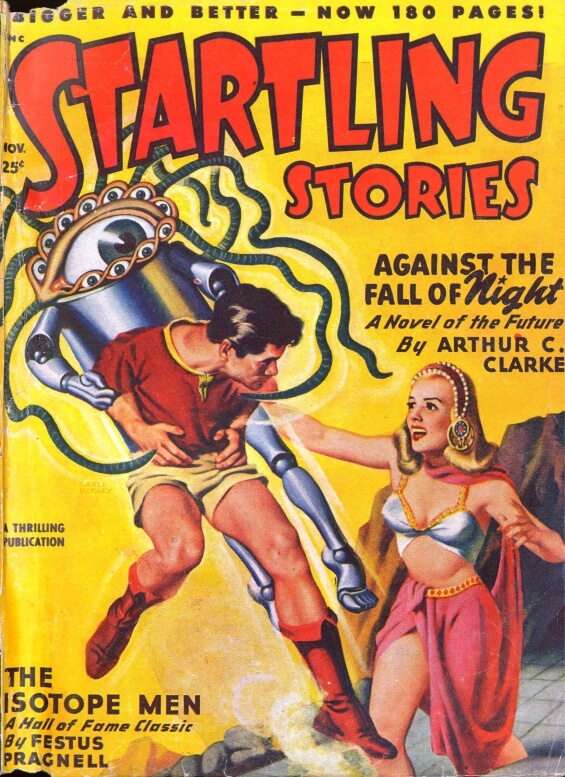
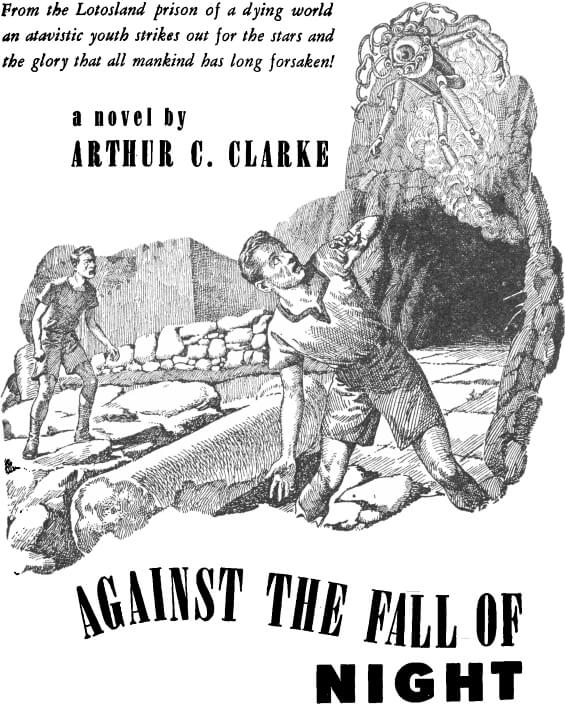
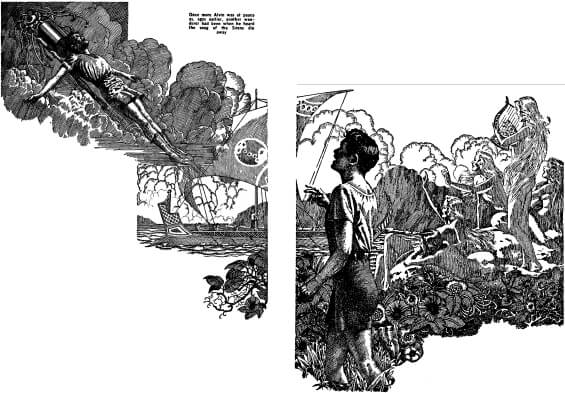
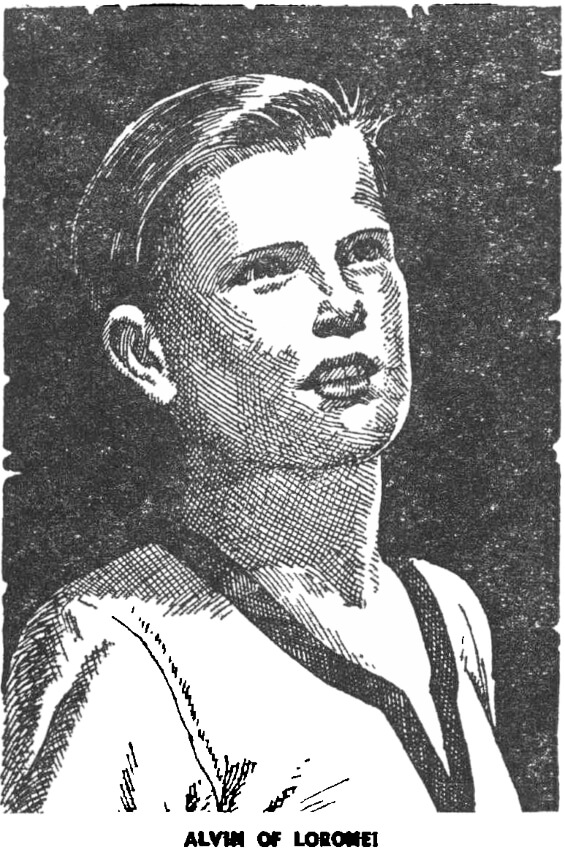

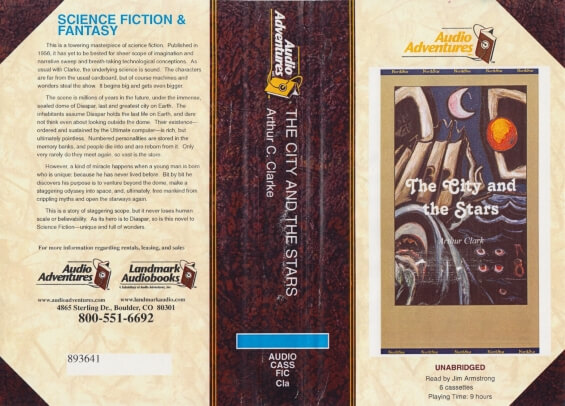
Posted by Jesse Willis

 Reading, Short And Deep #097
Reading, Short And Deep #097
Eric S. Rabkin and Jesse Willis discuss The Stroke Of The Sun by Arthur C. Clarke
The Stroke Of The Sun was first published in the Galaxy, September 1958.
Here’s a link to a PDF of the story.
Posted by Scott D. Danielson

 Reading, Short And Deep #096
Reading, Short And Deep #096
Eric S. Rabkin and Jesse Willis discuss Moxon’s Master by Ambrose Bierce
Moxon’s Master was first published in the San Francisco Examiner, April 16, 1899.
Here’s a link to a PDF of the story.
Posted by Scott D. Danielson

 Reading, Short And Deep #094
Reading, Short And Deep #094
Eric S. Rabkin and Jesse Willis discuss And All The Earth A Grave by C.C. McCapp
And All The Earth A Grave was first published in Galaxy Magazine, December 1963.
Here’s a link to a PDF of the story.
Posted by Scott D. Danielson

 The SFFaudio Podcast #447 – Jesse and Paul Weimer talk about The Forever War by Joe Haldeman
The SFFaudio Podcast #447 – Jesse and Paul Weimer talk about The Forever War by Joe Haldeman
Talked about on today’s show:
1974, if everybody in the modern era writes like him…, depth beyond the good writing and the ideas, what does it MEAN?!, a straightforward 1970s novel, ever further into the future, future-shock, war, Ken Burn’s Vietnam documentary series, accelerated time, mid-2016 and now, WHAT the bleep has HAPPENED?, clown show, a politically traumatic time, 1967-1968, 1968-1969, Paul is my senior, draft dodgers taught Jesse, “not my president, hashtag”, leaving the USA for Canada, they stayed, making a peep, the elites (or quasi-elites) might have to go, the real plutocrats always found a way out, Jimmy Carter, McCain, John Kerry, that trick still works, the Russia thing, collusion, what skills does he bring to the table?, the John Podesta emails, Bill and Hill Clinton, flipped the script, they swift-boated him, a perennial technique, bringing it back to the book, all weird, another tour, all word, Earth is a dystopia, Earth became Texas, the first section, training on Charon, power-armor, technology, silly and weird predictions, Mogadishu, Somalia, the farm, lawless Horn of Africa, the center cannot hold, ever expanding military, no health-care for the mom, death-panel, trying to figure out what’s going on in the mind of the author, an analogy, this is why people sign back up (go on another tour), going back and forth, the big takeaway, oh, my mom’s gay, everybody’s gay!, everybody’s multi-racial now and I’m the queer, that’s interesting, now everybody is a clone, a hyperbolized version of the political changes, Cassius Clay -> Muhammad Ali (and great) -> now he’s a war-resister, the kind of military SF, Starship Troopers by Robert A. Heinlein, Ender’s Game by Orson Scott Card, Armor by John Steakley, Old Man’s War, ooh it’s a twist (he’s not even white!), the movie adaptation of Starship Troopers, doing something slightly different, following forward, Jesse’s a big fan of the montage, tedium mixed with fear and shock, the military-industrial complex, romance novels for men, a focus on the specs of the pistols, the serial numbers on their special hand-grips, what gets them going in the night, he did a lot of math, gravity curves, MIT, political stripes, the legalization of cannabis, the acceptance of homosexuality, having latent feelings, a little looser, among those artist types, he’s the “old queer”, a funny twitter conversation: what’s really lacking today…, VHS vs DVD, we’ve become more prudish, conservative marketing, “no, we’ve lost context”, sexist!, homophobe!, “a latent heterosexual”, whenever you put a pressure on a large group of people results happen, everybody in our society is gay now, isn’t that interesting, look at the way we’re living now, the lack of context rule, when Potter converts to heterosexuality…, he’s not trying to target the audience of today, Heinlein was a weird guy, the way he obliquely attacks problems, no qualms about this book, an asexual cyborg, Forever Free, Forever Peace is excellent (Paul doesn’t like it), all about drone warfare, more artificial, The Accidental Time Machine, funny and delightful, Haldeman on Prisoners Of Gravity, he won everything (it was political), overwhelming, a thoughtful and reasonable guy, four serials of this book, Analog, Hero, “Screw you, sir!” -> “Fuck you, sir!”, Robert A. Heinlein’s naval service, a deep respect for the military, a hippie planet called “Middle Finger”, it starts with a “fuck you” and ends with a “Middle Finger”, Mandela’s psychological profile, leading from a position of empathy and ideas (instead of will), how the Marxist soldier during the Spanish Civil War would do business, ambiguous (ambivalent) feelings, Mike Vendetti, not something you take lightly, his emotions in his tweets, he’s got mixed feelings, a big mistake!, this war didn’t need to happen, ultimately the lesson, “support our troops”, taking a knee, a conflation with honouring the military, into the arms of the other f-word (fascism), a very nice point, politicians manipulating the people is nothing new, actual journalism with a critical eye, both Gulf Wars, “embedded with the troops”, stories in a patriotic light, propaganda, still happening today, Brian Williams’ ‘beauty of our missiles’, this book misses, told tightly from Mandella’s POV, the veterans are toured around the world, the comic book adaptation of The Forever War by Marvano (artist), Gay Haldeman (translation) and Joe Haldeman (script), Titan Comics, he stacked the deck, a counter-pole, there’s nothing here, the serialization, We Are Very Happy Here, necessary for serialization, a plot contrivance, 84-year old moms, joining the army for financial reasons, Marygay’s mother and father, true for the people of Somalia, pirates don’t do piracy for the sea-shanties, manipulated for our benefit, in the tradition of Starship Troopers (and not in the tradition), Heinlein’s generation vs. Haldeman’s generation, war with aliens, we become the alien, “you don’t understand politics”, why veteran are the only people are allowed to vote, politics of the era of Nixon vs. the politics of the era of Roosevelt, a “take that”, there was a revolt of veterans on earth at one point, the Bonus Army, the Revolutions Podcast, support our troops is a whip, the American support of the French in Vietnam, depending on how you calculate, a sunk cost fallacy, JFK needed to keep the war going past the next election, we can only badly infer it, what Jesse appreciated about Ender’s Game, a wish-fulfillment avatar for 13 year old boys, a lot of time in the online forums, reading a really deep reddit post, why that book is powerful, and here’s what’s missing, the general is a child, it kind of explains the real life generals, Netflix’s thinly veiled McCrystal biopic, there’s no job to be finished, there are no victory conditions, a frameworks for continuous unending war, without a draft it is an endlessly churning meat-grinder, a constant war economy, the government is being fleeced of its coffers by war profiteers, why is my standard of living falling?, pointing out the unfair, labeling it is not the solution, the Las Vegas shooting, “this is an act of domestic terrorism!”, we’re going to calm things down, slave revolts are not terrorism, labels are not the issue, the guns and the access to them are a bigger issue, people get caught up on the words and identity politics, sidestepping racism, sexual norms, a made-up name, he dodged the question, the charge of racism, google n-gram, nobody got suddenly racist, when they do the movie, Channing Tatum, they made a decision, socioeconomic status, a person’s story, the Ender’s Game movie, Johnny Rico is Filipino from South America, Ensign Kim is Scandinavian!, is it a weakness that the novel doesn’t explore racism?, a beautiful time capsule, Mandella’s psychology, Doctor Potter: I’m not prejudiced, the soldiers he was fighting beside were all his team and the fear of the enemy was more important than the colour of the skin of the soldier in the fox-hole with him, a media construction, real human beings, outside your bubble and your fears, deep deep resentment, prejudices of all kind, lived experience, ameliorating intolerance, a chance to grow and understand, an overoptimistic story?, a combat team, it treats racism as settled, let’s deal with homosexuality, Heinlein on homosexuality, a greater representation of gender-queer characters (male vs. female), painful and uncomforting, seeing the flaws within yourself, he’s a dude telling his own story, Diana, Margay gets her own standalone story, Spider Robinson, many changes, an excised fourth part, people read science fiction the wrong way, dangerous territory, Jesse you should read this this and this, this is a story of a dude like this…, reading off in my own direction, books written before I was born, reading the books written by the readers of recent books, unlike other genres (with the exceptions of mystery and crime), science fiction is a series of conversations between stories, your going to be missing a large part of the story, Day Million by Frederik Pohl, Friday by Robert A. Heinlein, I Will Fear No Evil, gay characters in a story is passe, I don’t read the stories for the characters at all, reading it for the societies, reading it for the science, I want to see my values reflected, the battle on that last planet, where’s the rest of the story, why people read science fiction (other than to see their values relfected), world-building, effusive for Ringworld, literal world-building, reading to see representation, an era of character based, having not seen themselves they want to see themselves reflected, a sense of wonder, Paul Atreides is someone Paul could sink into, a white male protagonist, they’re not the classic, how cool the other stuff in that book is, why am I having a whispered conversation with this weird lady in my bedroom, kids never pay attention to the author until you graduate from that, cover artists, aha!, this other thing: the author, this Miguel Ferrer is the actor (not the writer), Tom Cruise movies have no writers, the French focus on the film director, it’s not the characters to me, what makes science fiction so different, soft science fiction, looking at trends and forces, here’s a society with a guaranteed annual income, he’s probably male, that Mack Reynolds novel stands out because it is representing me, the scarcity of jobs is important, world-building enough to spend, there’s no one true way to read science fiction, to misquote Rudyard Kipling, alien planets, we get to see Heaven (a paradise planet), we get to see life on a little planet in the Lesser Magellanic Cloud, a deep dive into William Mandella, academic to grunt, what a soldier’s life is like, waiting in a time, a lover or a nurse, reading for the Marygay-William relationship, the Church of Science Fiction, if you read it for the romance you’re going to be disappointed, a Heinleinian bit, looking it as a modern book, are there books still to be written in this conversation?, how Jesse would film the novel, people don’t just live happily ever after, H.E.A. (a romance term), Jonathan and Gary of the Coode Street podcast, how you want to slice it, Linda Nagata’s The Last Good Man, the “Red” series, in this particular thread, digitizing The Lathe Of Heaven by Ursula K. Le Guin, Le Guin doing Philip K. Dick, a great appreciator of PKD’s writing, she’s trying to have a conversation with Philip K. Dick, the Lovecraft conversation is so loud and churning, fulminating, denouncers, he’s now at max volume, how many sequels to Innsmouth, Ben Bova, a legacy of Analog and Astounding, John W. Campbell seemed to interfere, a pretty stupid man in many respects, the telepathic (psionics), add some bullshit element and you’ll get a sale, nobody writes those (psionics) books anymore, Julian May’s intervention novels, The Many Colored Land, August Derleth, not only a bad writer (a bad person), show me an alien that thinks as well as a man but not like a man, nicely reflected in what happens to the humans, you poor deluded human, Murray Leinster, A Martian Odyssey Stanley G. Weinbaum, an important story, H.G. Wells, I’ve got these great ideas and this piece of paper, thinking through the ideas, tell a story based on that world, what makes Dune so great, a gender-swapped version of Dune, monks instead of nuns, set on a waterworld?, this book has something for everybody.















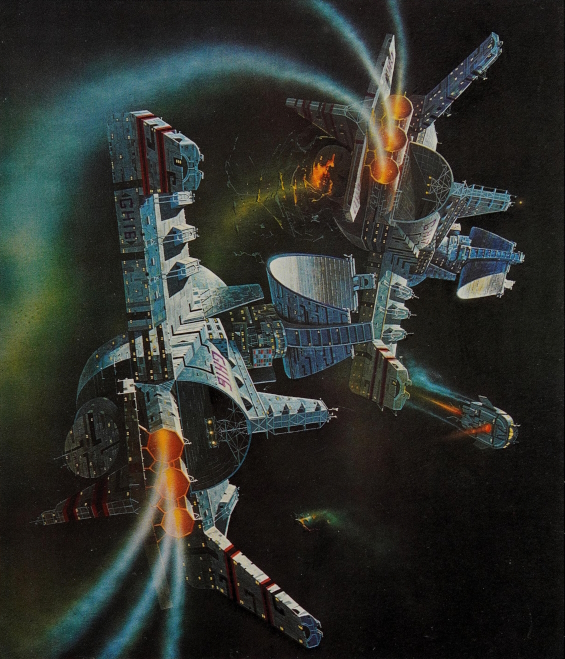
Posted by Jesse Willis